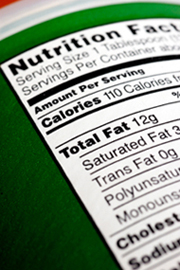Fat Gets Phased Out
Dining Services finds alternatives to trans fats

New York City has done it and so has Philadelphia. At least 15 states are considering it, including Massachusetts. What is the growing trend? A ban on artery-clogging artificial trans fats in restaurants, and Boston University is years ahead of the game.
BU Dining Services began eliminating trans fats two years ago, starting with the oil used in cooking French fries. It has stepped up its efforts in the last academic year; approximately 60 percent of trans fats have been eliminated from foods served in dining halls and the George Sherman Union.
“There were simple, quick fixes, such as the oils that we could switch right away,” says Bruce Perry, director of operations for Dining Services. Perry’s office analyzed every product used in the dining halls and across campus and put each item containing trans fats into categories based on how quickly it could be phased out.
Baking products like muffin and cake mixes pose the biggest obstacles, says Perry, because the manufacturers have not perfected alternative recipes yet. “Our ultimate goal is to eliminate trans fats on campus, but industry manufacturers are in the same process of figuring out how to do that,” he says. “So as they eliminate them, we will be able to do it completely. It’s hard to give a timeline of complete elimination.”
Trans fats are formed when hydrogen is added to vegetable oil, a process call hydrogenation. Vegetable shortening, margarine, cookies, crackers, and snack foods can contain trans fats, which prolong the shelf life of foods, maintain flavor, and give foods a desirable texture.
But trans fats have been linked to heart disease. “We have learned that trans fats are the most artery-clogging fat and that they raise bad cholesterol and lower good cholesterol,” explains Stacey Stimets, administrator of Sargent College’s Nutrition and Fitness Center and a registered dietician. “There’s no requirement for our body to have trans fat, and it doesn’t provide any benefit to us. It actually only increases our health risk.”
Stimets says that a January 2006 mandate by the U.S. Food and Drug Administration that food manufacturers list the amount of trans fats in their products prompted many of them to rethink their recipes. “Goldfish used to be made with trans fats, but they reformulated the recipe and now use liquid oil,” she says. “When you have to tell consumers you are using trans fats, that’s an incentive to change your recipe.”
Because Americans are becoming more conscious of healthy food choices, there is a trend in the industry to offer these products, Perry says.
BU has been out in front in that effort as well. Dining Services worked with Stimets to create the Sargent Choice line of foods, which are nutritious and contain no trans fats. These foods are available in dining halls across campus.
“We were looking at healthier, more flavorful options,” says Perry. “We have partnered with Sargent, and we have incorporated organic and local foods, so it was a natural progression to look into eliminating foods with trans fats.”
Meghan Noé can be reached at mdorney@bu.edu.